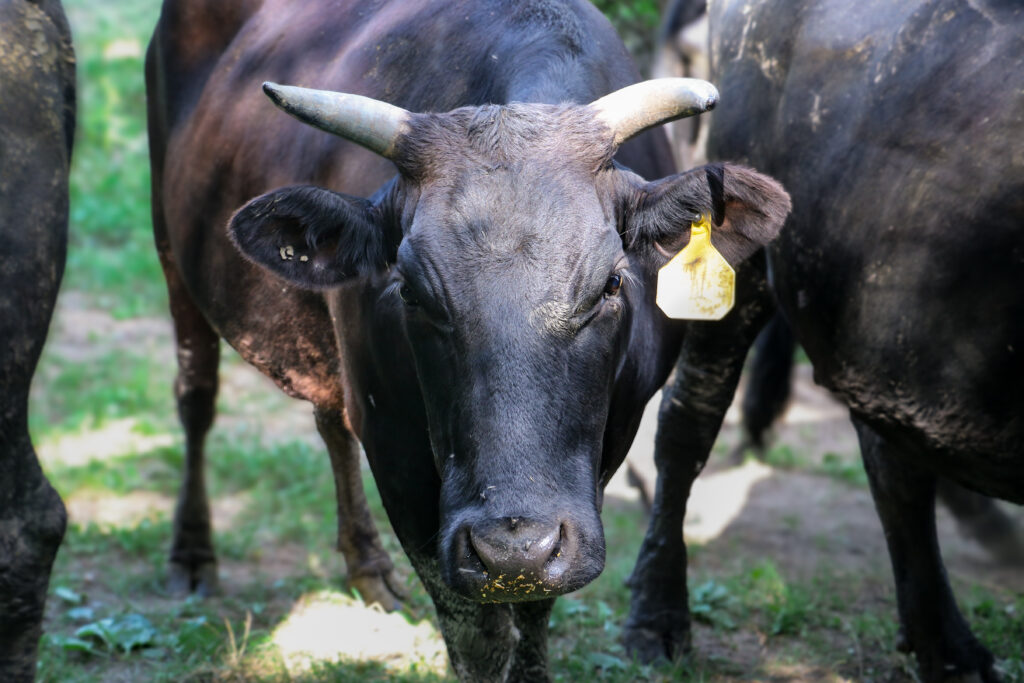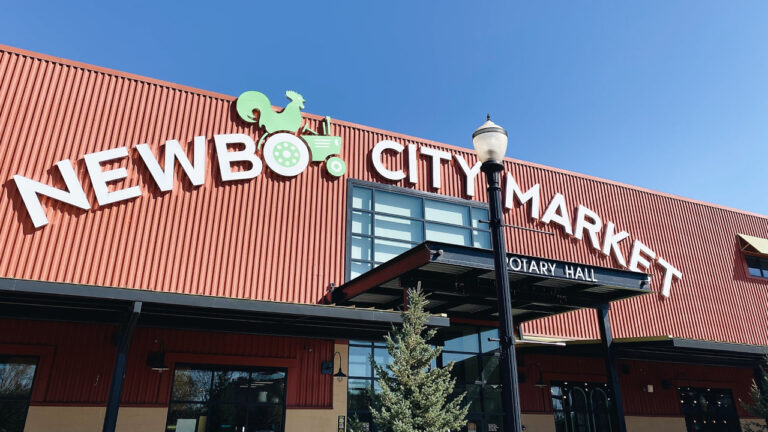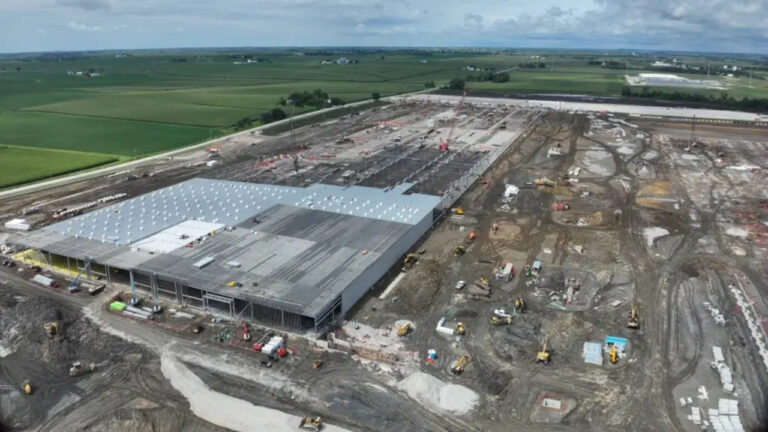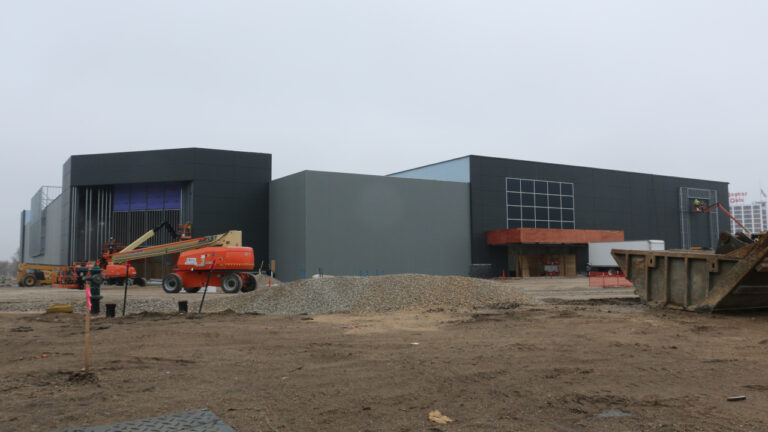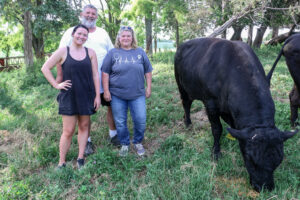
Sarah Bailey and Kyle Schuchmann of Jiyu American Wagyu talk about the genetics of Wagyu cattle and breeding technology as casually as others might discuss Hawkeye football or the latest episode of a hit TV series.
They’ve produced some of the nation’s most highly-regarded Wagyu beef cattle for nearly two decades from their rural Iowa City-based operation, which means an intimate knowledge of the industry comes with the territory.
Despite all the accolades and positive customer feedback, the two readily admit that raising custom Wagyu beef cattle that adheres to the centuries-old standards of its Japanese ancestry is a challenge — and one that comes with its share of evolving development, as part of ever-higher quality standards.
In fact, Jiyu describes itself as “a distinguished producer of luxury grain fed Wagyu.”
“To us, beef is not just a commodity,” Ms. Bailey said.
“I’d say it’s more like a quest,” Mr. Schuchmann added.
Wagyu beef’s history
The Wagyu beef industry is now well-established in North America, with around 150 U.S. producers registered with the American Wagyu Association.
But the term “Wagyu” itself isn’t a random term — it’s a very specific reference to cattle breeds native to Japan.
The first four Wagyu cows — two Japanese black and two Japanese brown —were exported from Japan to the United States in 1976 through Wagyu World of Puslinch, Ontario, Canada.
No additional exports of Wagyu from Japan would occur until 1991, at which time semen from another bull was exported, and then in 1993 a group of both bulls and female Wagyu were exported.
The last exports of genetically pure Wagyu cattle from Japan were in 1997. In that year, the Japanese government declared Wagyu a “national treasure” and banned further exports of live animals and their genetics. Prior to the ban, there were limited exports of Wagyu to the United States, with less than 200 full-blood Wagyu cattle and some semen being imported.
The cultivation of American Wagyu since then has been through domestic breeders, some choosing to maintain a relatively high percentage of purebred wagyu cattle, while others have crossbred Wagyu bulls with Angus or other breeds to create Wagyu hybrids, which can offer some of the same taste and texture characteristics of purebreds but aren’t considered “true” wagyu.
The American Wagyu Association estimates that there are roughly 30,000 Wagyu-influenced cattle in the U.S., with only about 5,000 being full-blood Wagyu.
For clarity, the term “Kobe beef” is even more specific, and authentic Kobe beef is rarely found outside Japan.
“You’ll never hear us say we have Kobe beef,” Mr. Schuchmann said. “That’s a big no-no. A lot of people (say they) have Kobe beef, but true Kobe beef is from the Kobe prefecture in Japan. It’s like Nike tennis shoes.”
“It’s really strict, and it’s taken very seriously,” Ms. Bailey added. “(There are) a bunch of Americans who say, ‘we raise Kobe beef.’ No, you don’t.”
Origins of Jiyu American Wagyu
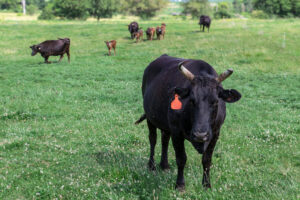
Ms. Bailey founded Bailey American Wagyu “around 2002,” she says, after years of breeding show cattle and embryonic experimentation.
“It was a matter of competitiveness and consistency,” Ms. Bailey said. “Show cows are very inconsistent, and it takes a lot of work. I could breed 60 cows, and I would get maybe 15 or 20 that were worthy of being a show calf. You had to work with them, figure out who’s quality enough. I would have my pool that were going to be show calves that I sold, and then I had my pool of just beef that I was going to take to the sale barn. I got tired of that, and I wanted everybody to be a winner. Show cows are fed beautifully, but the genetics just aren’t there, and they really aren’t, in my opinion, a good eating experience.”
Ms. Bailey’s search for new breeding methods led her to visit the home of the then-president of the American Wagyu Association.
“He told me ‘these are the full-blood (Wagyu) I have,’” Ms. Bailey said. “And I thought they were too expensive. So I asked him how many old cows he had. I figured if I can get one calf out of an old cow that might only have one or two calves left, I can make it worth my while. And I do really well with old cows. So I bought every old cow he had.”
The term “Jiyu” (meaning “freedom” in English) was included in the operation’s name in 2020 as an homage to the Japanese roots of Wagyu beef.
“My ex-father-in-law was an engineer for GM, and when he went to Japan he experienced a lot of Japanese beef,” Ms. Bailey said. “They get insulted if you don’t follow their protocol and customs, and he was such a good guest because he was really mindful about what he did and what he said. And then I thought, can I do that? So I looked into how much (it would) cost to get Wagyu semen and Wagyu embryos, and then I decided I was going to change it. I was going to change everything. When I decided on Jiyu American Wagyu, I meant that to set us apart, so the Japanese would (know) I wasn’t trying to say I was one of them.”
Jiyu’s current operations
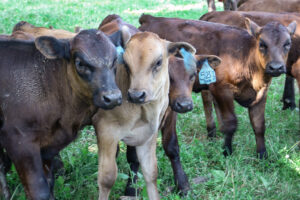
Jiyu is now among the oldest and largest Wagyu beef producers in Iowa, with cows raised on a number of farms stretching from West Branch to Tipton.
Mr. Schuchmann came to the partnership more recently. He moved to Johnson County in 1998, and had a lengthy career in law enforcement for the state.
Also a lifelong farmer, he says he “got into breeding stock angus as a second job” before working with Jiyu.
He became acquainted with Ms. Bailey through her work with the West Branch Animal Clinic.
Ms. Bailey and Mr. Schuchmann bring different strengths to the operation. Mr. Schuchmann has a self-described passion for genetics and feeding, and regularly speaks to new producers about optimal techniques.
Each animal at Jiyu receives daily pasture access with rotational grazing to promote natural foraging and digestive health under careful monitoring. Calves are introduced to gentle handling from birth, so they remain calm and accustomed to routine interactions as they mature.
Their feeding program blends locally grown forage with supplemental grain under veterinary oversight to support consistent marbling and overall well-being.
Conversely, Ms. Bailey focuses on Wagyu sperm refinement and production of Wagyu embryos, whether by artificial insemination (AI) or embryonic transfer (ET).
Ms. Bailey said she feels Jiyu’s end-to-end process is uncommon in the Wagyu industry.
“I would say the percentage of farms raising Wagyu that do the whole process, from raising them to having their own crops and feeding them, is probably really small,” she said.
Most of Jiyu’s herd is pureblood and full-blood Wagyu, but the operation has started “dabbling” in crossbreeding “because of the need for data on bulls and semen we are selling to very large angus operations in the western U.S.”
Jiyu processes about 50 carcasses a year for processing and shipping by various lockers around Iowa and across the Midwest. But it’s not a speedy process.
“To make one Wagyu, from breeding to market, takes about four years,” Ms. Bailey said. “Wagyu people compare raising Wagyu to making wine. What you envision and what you do today, the product you think you’re making — you really don’t know what you’ve made for years.”
Thus, a long-term commitment to see things through becomes critical, she said.
“It takes that amount of time (four years) to reach maturity,” she said. “So the decisions you make this year affect the decisions the next year, and you don’t know if that decision is the right decision, and it goes on and on. It’s a real guessing game on what you’re doing, and it takes a lot of patience.”
“Wagyu is really artisan beef making at its best,” Mr. Schuchmann added. “Genetics, speed, time and management are your keys. Most of the people in the United States can’t make prime Wagyu because they don’t have the artisan part.”
Jiyu also exports semen and embryos to producers across the United States, and is looking to expand its market to the European Union in future years.
Jiyu has also added a new employee, administrative assistant Madison Zeringue, a native of Abita Springs, Louisiana, who answers the phone, schedules appointments, and handles general chores around the operation.
Ms. Bailey and Mr. Schuchmann also own a separate company, Rapid Creek Angus, a small high-quality bull and replacement heifer cattle operation.
Quality and health benefits
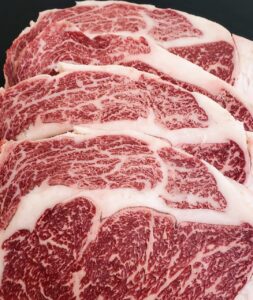
Ms. Bailey and Mr. Schuchmann tout the health benefits of Wagyu beef, especially noting that unlike the saturated fat found in most traditional beef, the fat in wagyu is unsaturated, similar to avocados, olive oil and salmon.
They also maintain that Wagyu beef as a whole is far superior in quality to standard beef.
“There’s no bad cut of Wagyu,” Mr. Schuchmann said. “If you went into the grocery store and you bought a (standard) skirt steak, normally a cheap cut, you’d have to marinate it, tenderize it, the whole nine yards. You can throw a Wagyu skirt steak on the grill, and it’s just a wonderful steak.”
Wagyu beef often has substantial intramuscular marbling. The goal of Wagyu beef production is fine flakes of intramuscular fat, or “shimofuri” in Japanese.
“I want it to be like little pieces of snow,” Ms. Bailey said. “I don’t want any big pieces of fat. That’s my personal goal. To me, it’s like meat porn.”
Jiyu also owns an MIJ camera, which uses special photographic technology to assess and grade Wagyu beef to be assessed and graded by Wagyu beef experts in Japan. Ms. Bailey and Mr. Schuchmann believe they’re one of the few Wagyu producers in Iowa with the technology.
Wagyu classification issues
Wagyu beef classification in the United States is far from standard, according to Mr. Schuchmann.
“There’s Wagyu all over the place,” he said. “You can get meat at Costco or Hy-Vee that says ‘Wagyu’. But the USDA has a labeling issue, and they don’t know how to classify it.”
To be legally labeled Wagyu by USDA standards, beef only has to have 46.9% Wagyu genetic content to be sold at retail.
“The problem is, the percentages (of Wagyu) aren’t always indicated on the packaging,” he said. “In most realms of the Wagyu world, if you say American Wagyu, you’re talking about some sort of percentage of Wagyu.”
There are five different percentage categories for Wagyu beef — F1, or half-blood (46.7%), F2 (75% Wagyu), F3 (83.75%), F4 (93.75% considered purebred) and F5 (100%, or full-blood).
“In the United States, they’re all labeled as Wagyu,” Mr. Schuchmann said. “If you go to a restaurant and order Wagyu, you really should be asking, what percentage is this? But the restaurant won’t know, because they don’t have any idea. So it’s an ongoing issue on how to label it.”
The products command a premium price. Jiyu’s price sheet shows a range from $9 per pound for burgers to $45 per pound for flatiron steaks, $70 per pound for ribeyes and New York Strips, and $120 a pound for filets, with a wide range of products in between.
Genetics and Oh No, plus a promising future bull
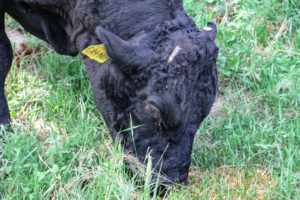
Ms. Bailey is certified in artificial insemination and embryology, but there was always an issue with her herd’s genetic makeup.
“For years, I didn’t have a bull and I just bred all my own cows with semen from elsewhere, and life was just getting complicated,” she said. “When you artificially inseminate a herd and you don’t have a bull, you really have to pay a lot of attention, because economically, it’s not very wise to have open (non-pregnant) cows. So your world revolves around watching cows. I decided I’d had enough with that. So I made a cleanup bull, and he turned out to be a bit of a phenomenon.”
That bull was named “Oh No” because of a sudden realization of his genetic capabilities, Ms. Bailey said.
“It was an epiphany over the dinner table one night,” she said. “We realized the one constant we had was Oh No. I had a full-blood Wagyu herd, but I still had kind of a mess from my prior life, a little bit of this and a little bit of that. With Oh No, it didn’t matter. And it’s not just marbling. There’s different levels of flavor as well. With every (offspring), it was like, wow.”
At around 1,400 pounds, Oh No isn’t considered a large bull, but 95% of his carcasses hang at weights from 950 pounds to 1,300 pounds.
“Usually you lose about a third of a cow’s weight when they’re hanging,” she said. “His carcasses are nearly the size of the bull himself. That’s amazing.”
Oh No’s semen has been distributed around the country and around the world, with success at every turn.
Through genetic testing, Ms. Bailey learned that Oh No is “kind of an anomaly” in his successful breeding rate.
“There’s one other known bull that can do what Oh No is doing,” she said.
The meat from Oh No’s offspring is being tested in a lipid study at Clemson University and in a grass feed study at the University of Hawaii.
And beef from Oh No’s progeny has won several awards at the Triple Crown Steak Challenge hosted by Auburn University, including an F3 grand champion award in 2024 and an F1 championship in 2023.
As Oh No ages, Jiyu is searching for a bull that can meet his quality standards, and they say a current bull from Wagyu World — Eejanaika, meaning “Ain’t It Great” — is showing promise as a possible Oh No successor.
Restaurant customers
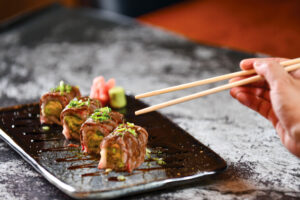
In addition to sales of specific cuts and whole carcasses to individual consumers, Jiyu American Wagyu has developed an extensive list of local restaurants who use their products.
Among them is Sushiya, a sushi restaurant in North Liberty.
Li Chiou said her husband, Vincent Chia, the restaurant’s owner, came to appreciate the appeal of Jiyu’s products over time.
“He always wanted to keep the high quality, and we hadn’t previously had any steak in our sushi,” Ms. Chiou said. “People here in the Midwest love meat, especially steak, so one day I asked Vincent, ‘why don’t we have (beef),’ and he said he couldn’t really find a good one, and whenever he found a good one, it was too expensive to use on a sushi roll.”
She said a visit with Sam Gelman, owner and chef at The Webster in Iowa City, changed their mind.
“Sam said we can get Wagyu from a local farmer,” Ms. Chiou said. “We said ‘really, we have a (Wagyu) farmer here?’”
As natives of Taiwan, whose food culture has been heavily influenced by Japan, Ms. Chiou and Mr. Chia were well aware of the appeal of Wagyu beef. They introduced their first Wagyu menu item about two years ago, and now Jiyu Wagyu is used in three Sushiya dishes —Torched Wagyu Beef Roll, Wagyu Nigiri and Wagyu Sashimi.
“We got a chance to visit their farm, and become friends with Sarah and Kyle,” she said. “We know how they manage and take care of those cows. They work so hard, they care about their job, and we trust them, so that’s why we’re continuing with them.”
Meanwhile, Mr. Gelman said he’s made several purchases from Jiyu Wagyu, which has become one of his two primary Wagyu beef suppliers for use in dishes at The Webster.
He said the animals are processed at Bud’s Custom Meats in Riverside and hung for about two weeks before being further split into various beef cuts.
Some of the cuts are used immediately, while others are frozen or aged on-site in the Webster’s dry-aging case for use in the restaurant’s wide-ranging small beef and large beef programs.
“We’re using essentially the whole animal,” he said. “The quality of the product speaks for itself. Jiyu beef is phenomenal. We’ve gotten three animals from them, plus some supplemental parts here and there, and it’s always been outstanding. I think their genetics are top notch. The marbling is fantastic, and the flavor is great.
“Obviously the quality is number one, and being able to support our local communities is really important to us, especially during the shorter growing season here,” he added. “And when we’re dealing with whole animals like that, and working directly with a farm, we’re able to kind of cut out the (middleman). The further you get from the farm, the more money is going into other people’s pockets. So we try to keep those relationships small. We’re able to get a pretty high yield out of the animal, and we can price it accordingly and still make our margins. We’ve worked with Kyle and Sarah for a couple years now, and we’ve been out to the farm to check things out. They’ve been great to work with.”
In addition, The Iowa Gold burger at Wilder in Iowa City, featuring Jiyu Wagyu beef, was one of 10 finalists in the 2025 Iowa Cattlemen’s “Best Burger in Iowa” contest.
Other restaurants in the Corridor that use Jiyu beef include Mandarin Spice in Cedar Rapids (for private parties) and Vue Rooftop in Iowa City, which is hosting a ticketed “Farm To Fork” event Sept. 18 featuring ingredients from several local producers, including a “22-Day Dry Aged Jiyu Wagyu Strip.”
Drive for competition, industry improvement
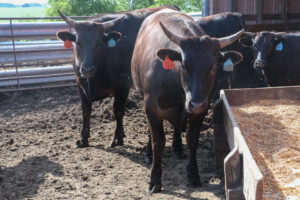
Like many producers, Jiyu Wagyu is constantly striving for improvement, but Mr. Schuchmann and Ms. Bailey see that competition differently.
“I don’t necessarily have a drive to be the best,” Mr. Schuchmann said. “The only thing I want is to make a better product every year. I don’t need to beat you. If you beat me and you win the Triple Crown Steak Challenge? Congratulations. I don’t have this horse race mentality that I’ve got to be the best.”
“I’m a little bit different than Kyle in that I do want to beat you,” Ms. Bailey said. “We aren’t selfish with what we know, and we’ll willingly tell you anything you want to know. But I’m in a competition with myself. If I beat you, it will please me greatly, but I will help you become as good as you can be. If I’m not, I’m not mad at you. I’ve just got to make myself better.”
Ms. Bailey is a founding member of the newly-formed Wagyu National Junior Association, promoting Junior Wagyu activities throughout the U.S. and encouraging youth involvement as well as Wagyu community support. She also maintains membership in both the American Wagyu Association and the Australian Wagyu Association, promoting the industry and expanding its reach to a wider audience.
Currently, Jiyu doesn’t have a website, getting most of its business through word of mouth and industry reputation. But that may soon be changing, Mr. Schuchmann said, as demand for Jiyu’s genetic products continues to grow.


